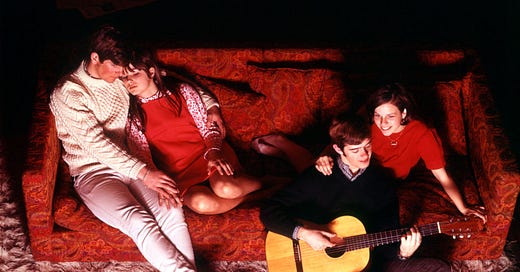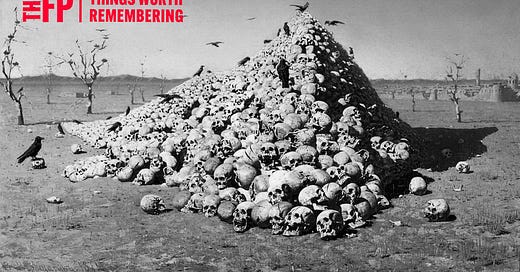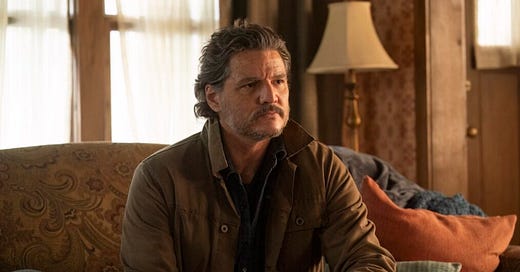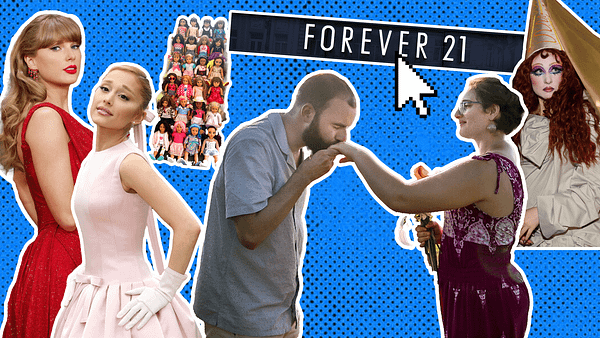
The Free Press

The relationship between the sexes and our epidemic of loneliness are two topics we keep coming back to at The Free Press. It’s a big reason why we chose the legacy of the sexual revolution as the subject of our very first live debate, happening in L.A. on Wednesday, September 13. The event, moderated by yours truly, will pit musician and producer Grimes and writer Sarah Haider against Red Scare podcast co-host Anna Khachiyan and author Louise Perry. (Get your tickets here.)
We know many of you won’t be able to make it to the debate (don’t worry, we’re recording it). Meanwhile, over the coming weeks, we are bringing you a few essays that explore these ideas.
Today, we’re pleased to present Rob Henderson on the decline of marriage—and why he thinks our current dating scene is making singles less happy. —BW
When my late, adoptive grandparents met back in the 1950s, after about two weeks, my 21-year-old grandfather proposed to my 18-year-old grandmother. She replied that she had three requirements for him: stop smoking, stop drinking, and stop gambling. My grandfather agreed, immediately dropping all three habits, and never returning to them. They were married for more than sixty years and raised four children.
Today, it is laughable to imagine such a scenario occurring in the U.S.
Earlier this year, the American Perspectives Survey collected data from a representative sample of more than 5,000 U.S. adults aged 18 and older. Some of the findings are predictable. Other results are surprising. Few of them would make sense to my grandmother, a devoutly religious homemaker.
New Deal-Breakers: Politics and Feminism
Unlike my grandmother’s red lines, the deal-breakers singles have today are less contingent on a person’s actions—like smoking or drinking—and more so on their beliefs.
Sixty-five percent of Democrats and 62 percent of Republicans say they would be less likely to date someone of the opposing political party. Interestingly, conservatives are less willing than liberals to date someone with “extreme” views, even if they are on the same side of the political spectrum; only 26 percent of conservatives would date someone who was “extremely conservative,” while 45 percent of liberals say they would be willing to date someone who was “extremely liberal.”
The survey also found that being a feminist is more of a liability than a benefit. Forty-two percent of Americans say they would be less likely to date someone who is a feminist compared with 15 percent who say they would be more likely to date a feminist, while 40 percent say it wouldn’t influence them one way or another. Being a male or female feminist, in other words, is unlikely to score you a date.
What’s more, feminism has upended the dating rules. Relationships used to begin with courtship: meeting families, spending lots of time together—including in public—marriage, and then, finally, sex. Today, relationships among young people commonly begin with sex, then turn into a “situationship,” then “seeing each other,” then perhaps a discussion about monogamy—“Are you seeing anyone else?”—then, maybe, exclusivity. But a lot of relationships don’t even go that far. They get stuck in a holding pattern of casual sex, which often benefits guys the most. Women don’t want to seem vulnerable, so they don’t bring up the possibility of commitment and hope maybe the guy will like them enough to raise the topic themselves.
A recent study found that after casual sex, women, on average, report high levels of loneliness, unhappiness, rejection, and regret. Conversely, men report higher satisfaction, happiness, contentment, and mood improvement.
This is one of a few dynamics where social progress supposedly intended to benefit women instead ended up benefiting men.
Men Are Happier Than Women
Back in the 1970s, when there was zero maternity leave and the pay gap was at its peak, women reported having higher well-being than men.
Over the past several decades, though, this has reversed. Women’s self-reported happiness has plummeted. While today both men and women are less happy, men report higher well-being than women.
How can this be, when women now make up 59.5 percent of college students and earn the majority of bachelor’s, master’s, and doctoral degrees? Today, in nearly half of opposite-sex marriages in the U.S., women earn the same or more as their husbands. A survey by researchers at the Brookings Institution found that U.S. parents, regardless of political affiliation, are now more worried about their sons than their daughters.
Perhaps the reason is the fact that marriage, over the past five decades, has dropped by 60 percent. Indeed, new research from the University of Chicago found that marriage is “the most important differentiator” of who is happy in America, and that falling marriage rates are a chief reason why happiness has declined nationally. The study revealed a stunning 30 percentage point happiness gap between married and unmarried Americans. As the American Perspectives Survey report notes, “No social change has altered the fabric of American life so profoundly as the decline of marriage.”
One reason for the decline in marriage is the rise of cohabitation. The number of Americans cohabitating with their romantic partner has more than doubled over the past three decades. A recent survey found that men in cohabiting relationships are just as satisfied in their relationships as married men—but women in cohabiting relationships are 13 percentage points less likely to say they are satisfied compared with married women.
Here’s another example: today, a record 44 percent of women under 30 consider themselves to be liberal, compared with only 25 percent of men in the same age category. But evidence suggests that both liberal men and women are less interested in committed relationships than their conservative counterparts. For instance, a survey from the Institute for Family Studies found that 58 percent of unmarried Republicans are interested in marriage, compared with only 47 percent of unmarried Democrats.
This gap is exacerbated by the fact that as women become more successful, their standards for an acceptable romantic partner tend to increase.
Relative to men, a larger percentage of women say that “not being able to find someone who meets their expectations” is a major reason they are single. If you’re a woman, and you decide to rule out everyone who is right of center, and you want someone with a commensurate degree (young men continue to drop out of education and the workforce), then your dating pool will be very small indeed.
That is, if you decide to date at all.
Little Interest in Dating
According to the American Perspectives Survey, 43 percent of young women say they have no interest in dating whatsoever, compared with 34 percent of men. This is consistent with other survey data indicating that 55 percent of women now say that dating has gotten harder in the last 10 years, compared with only 39 percent of men. Among young women, the new survey shows a little less than half are single. Among young men aged 18–29, 6 in 10 are.
As young men continue to drop out of education and the workforce, educated and successful women will find it increasingly difficult to find a decent male partner. And once the sex robots/hyperrealistic VR arrives, forget it. At that point, even a lot of the smart and talented men in your life will straight-up disappear.
My grandma had four kids by the time she was 30 years old. One of them eventually adopted me. But if she had been born under a different set of circumstances, or slightly later, none of that might have happened at all.
The story of how my grandparents became married feels like a relic of a bygone era, when demanding more from your partner was reasonable and expected.
Previous generations didn’t have many options, so they stuck together through hard times and made it work. Now, abundance (or its illusion on dating apps) has led people to feel less satisfied. People are now more anxious about making a choice and less certain that the one they made was correct.
One classic study found that consumers were more likely to buy a jam when they were presented with six flavors compared to 30. And among those who did make a purchase, the people presented with fewer flavors were more satisfied with their choice.
These two factors—demanding more of your partner and understanding that abundance is not always favorable or desirable—should be a lesson that will guide us toward healthier and more fulfilling relationships. Shutting off the dating apps and reducing our choices will actually give us a greater appetite for love.
A version of this essay first published on Rob Henderson’s Substack. Follow him at @robkhenderson.
Don’t forget, we want to see you at our first live debate on Wednesday, September 13, at the Ace Theatre in Los Angeles! Has the sexual revolution failed? Come argue about it and have a drink. We can’t wait to meet you in person. You can purchase tickets now at thefp.com/debates.
And to support more of our work, become a Free Press subscriber today:
















The sobering conclusion of this truthful and well written piece came to me a few years ago, when I started watching 24 hours A & E. I've watched this British series, all seasons and episodes more than once now; every time I need a boost in remembering human kindness, patience, logic, non hysteria, selflessness and indeed....true commitment. Many of the now elderly patients admitted were well under 20 years old when they committed , through marriage, to their partner . As you will hear and see all of them say, of course there were obstacles, but they stayed true and placed pride and value on their commitment once made. You will see multiple decades of marriages celebrated by families of great-, grand- and children. And yes, clearly seeing the generations following , presented with more "options" not being as successful in finding the right partner. Too many options confuses us. It sounds great but it is indulgent and negative. Imagine the feeling you have when looking at a huge menu, not knowing what to pick and end up regretting what you finally settled on. Less is more! Thank you Rob, for this article. It is brilliant and truthful.
"She replied that she had three requirements for him: stop smoking, stop drinking, and stop gambling. My grandfather agreed, immediately dropping all three habits, and never returning to them. They were married for more than sixty years and raised four children.
Today, it is laughable to imagine such a scenario occurring in the U.S."
Part of what makes this laughable is, sadly, the loss of the ability young women have to make demands on men at all.
When casual sex is so easily available, and when the "marriageable" dating pool has more men than women, women lose the stance from which they have a natural power to negotiate things like fidelity and good habits from men.
This is probably one of the most insidious ways modern feminism has screwed women, because there is no choice here, you can't really opt out - you have to adjust.
For young women who are very desirable - more physically attractive than average - this is easier to navigate, as you retain some leverage. You also tend to attract the kind of men who have high standards for themselves and are willing to put a lot of work into "woooing" a woman. These tend to be the kind of men who are also willing to invest a lot into anything long term - career, finances, commitment, children. These kind of men build your confidence, which increases desirability and leverage, and you end up being one of the lucky ones with a husband.
But for young women in the "average" department this culture creates huge disadvantages. With fewer marriageable men, and an environment where getting all the benefits of sex and a relationship without commitment, improvement, or sacrifice is easy for most guys to find somewhere, average young women are forced to use other means by which to "compete" - and often casual sex or shacking up is the only one they have.
And then that creates its own feedback loop: a girl has to sleep with men to get their attention, which degrades her self worth, which makes her afraid to make demands on men to be better, which leads to crappy men being drawn to her, and the downward spiral goes on.
I think this is where a lot of the current "queer" identification - which is overwhelmingly in young women - comes from. It's average looking young women who are dropping out of the dating scene with men because they just have insufficient leverage. And since "queer" identities have a lot of social cache, this is the easiest way that is available to them to make some meaning and find a place in society.
I've known multiple young women who were conventionally feminine, always dated and slept with boys, and then, often after a weigh gain, excessive promiscuity, or other event that reduced their "desirability", suddenly declare themselves generically "queer" out of the blue. They never date girls, they never even express any real physical desire in girls, and they don't physically transition into anything. They just announce the "queer" status, revolve their identity around "queerness", and rail against "heteronormativity." They always enter a long phase of nearly complete celibacy.
(This does not explain genuinely bi woman and lesbians, who of course exist because that really is how they are wired.)
Perhaps this "queer" celibacy is just a way for less desirable young women to opt out of a dating scene that is essentially a duck-duck-goose game they know they are going to lose. Maybe its a way to have access to old fashioned chastity while still projecting modern social attitudes.
I also think this culture feeds into the hysteria about "rape" and "harassment". Young women *really do* feel pressured into having sex. I think a lot do sense that their hook ups are not fully voluntary or wanted, not because the man in question is forcing anything physically, but because the entire culture doesn't give an average looking girl any leverage to really say "no." The entire experience makes them feel violated and unsafe, which is psychologically intolerable state for any female mammal, for whom safety and security is such a primal need.
The only way they can make sense of it all is to re-code promiscuous sex as "rape" and project fault for the unpleasantness of the encounter on the man.
Re-coding a hook up as "rape" and making the fault of the man also provides a psychological out for a less desirable young women where, rather than be forced to acknowledge that her lack of leverage is due to something about her lack of desirability, she can feel that she is SO desirable that men seek her out by force.
It's weird and twisted, but I worked at at therapist at a university for years, and after a while you just see some patterns that you can't unsee.
It's just fascinating to me to see old fashioned sexual mores - chastity, vulnerability, claims of victimhood at the hands of men - getting re-engineered as "progressive" expressions of feminism.